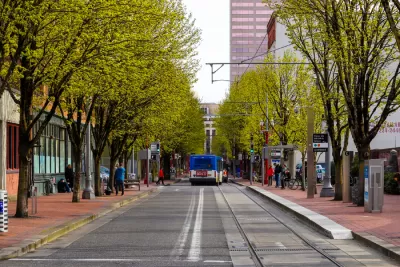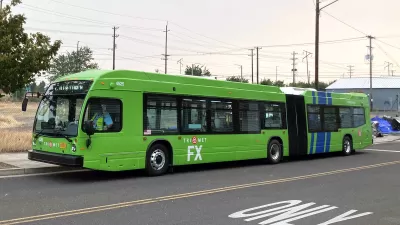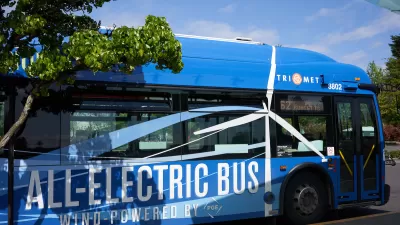The Tri-County Metropolitan Transportation District of Oregon plans to restore pre-pandemic service, expand its light rail lines, and move toward an all-electric bus fleet.

The Tri-County Metropolitan Transportation District of Oregon (TriMet) announced its budget for the fiscal year starting on July 1, which “includes $748.9 million in day-to-day operating requirements and $304.1 million in capital improvements. For the tenth straight year, the budget does not include a base fare increase.” Tia York, writing on behalf of the agency, highlights planned improvements. The article notes that “TriMet would need to increase our current operator ranks by more than 300 to return service to pre-pandemic levels,” but the agency is raising operator pay in an effort to recruit more drivers and restore and expand service.
“One of the big improvements our riders will see in the coming months is the launch of the first TriMet FX™--or Frequent Express–bus service, coming this fall to the 15-mile Division Street corridor, between Gresham and Downtown Portland. FX 2-Division will bring more people on board using longer, articulated buses that will allow for faster, all-door boarding and special signal and lane markings to help keep buses moving past traffic congestion.”
The agency will also replace its light rail vehicle fleet, extend the MAX Red Line, and renovate a facility to prepare for an electric bus fleet. “In April, TriMet announced the purchase of 24 long-range battery electric, zero-emissions buses from California-based bus manufacturer GILLIG. They will begin arriving in fall 2023 and more than double the size of TriMet’s fleet of 100% battery-electric buses to include some 35 vehicles.”
FULL STORY: Restoring workforce, improving service, adding electric buses priority in TriMet’s adopted budget

Maui's Vacation Rental Debate Turns Ugly
Verbal attacks, misinformation campaigns and fistfights plague a high-stakes debate to convert thousands of vacation rentals into long-term housing.

Planetizen Federal Action Tracker
A weekly monitor of how Trump’s orders and actions are impacting planners and planning in America.

In Urban Planning, AI Prompting Could be the New Design Thinking
Creativity has long been key to great urban design. What if we see AI as our new creative partner?

Cal Fire Chatbot Fails to Answer Basic Questions
An AI chatbot designed to provide information about wildfires can’t answer questions about evacuation orders, among other problems.

What Happens if Trump Kills Section 8?
The Trump admin aims to slash federal rental aid by nearly half and shift distribution to states. Experts warn this could spike homelessness and destabilize communities nationwide.

Sean Duffy Targets Rainbow Crosswalks in Road Safety Efforts
Despite evidence that colorful crosswalks actually improve intersection safety — and the lack of almost any crosswalks at all on the nation’s most dangerous arterial roads — U.S. Transportation Secretary Duffy is calling on states to remove them.
Urban Design for Planners 1: Software Tools
This six-course series explores essential urban design concepts using open source software and equips planners with the tools they need to participate fully in the urban design process.
Planning for Universal Design
Learn the tools for implementing Universal Design in planning regulations.
Appalachian Highlands Housing Partners
Gallatin County Department of Planning & Community Development
Heyer Gruel & Associates PA
Mpact (founded as Rail~Volution)
City of Camden Redevelopment Agency
City of Astoria
City of Portland
City of Laramie




























